Learn how biblical figures like Abraham and Daniel exemplify the gift of faith, inspiring a deeper exploration into the power of belief.

Examples of Gift of Faith in the Bible
Just as you're exploring the concept of faith, it's fascinating how the Bible unfolds numerous instances where the gift of faith is vividly displayed.
Consider Abraham's unwavering trust during his ultimate test, or Daniel's calmness in the lion's den; these stories are not just ancient texts but powerful examples of unshakeable belief.
You might find yourself intrigued by how these individuals could maintain such strong faith under extreme circumstances.
Let's embark on a journey to uncover the essence of their conviction, which might just inspire a deeper understanding of what faith truly means in your own life.
Key Takeaways
- The Bible showcases the gift of faith through individuals facing and overcoming extraordinary challenges, such as Abraham and Daniel.
- Demonstrations of faith through obedience, like Joshua at Jericho and Peter on water, illustrate the transformative power of trusting God.
- Faith triumphing over adversities, seen in stories like Elijah on Mount Carmel and in the fiery furnace, highlights divine fidelity.
- The impact of faith extends beyond the believer, influencing non-believers through divine interventions and acts of unwavering belief.
Abraham's Ultimate Test

In one of the most profound tests of faith recorded in the Bible, Abraham is commanded by God to sacrifice his son, Isaac, a moment that not only challenges but ultimately exemplifies unwavering trust and obedience. This narrative, deeply rooted in the fabric of religious discourse, unfolds a complex interplay of emotions, faith, and divine intervention that merits a closer examination.
Your understanding of this event must start with the miraculous circumstances surrounding Isaac's birth. Sarah's laughter, upon hearing the prophecy of her son's birth, encapsulates the incredulity and joy intertwined in the promise made by God. It's crucial to grasp that Isaac's birth to Sarah and Abraham in their old age was itself a testament to faith, setting the stage for the subsequent trial of Abraham's faith.
The command to sacrifice Isaac is a pivotal moment that demands a nuanced analysis. It's an exemplar of obedience, where Abraham's faith in God's righteousness and his willingness to submit completely to God's will are starkly evident. This act of faith doesn't stand in isolation but is a culmination of a journey of belief, from the promise of Isaac's birth to the moment of his near sacrifice.
In dissecting this narrative, you're not merely recounting a historical event but delving into the essence of faith as depicted in the Bible. It's a narrative that challenges you to consider the depths of trust and obedience one can have in the divine, illustrated through Abraham's ultimate test. This story, emblematic of faith's complexity, invites you to reflect on the multifaceted relationship between divine promises, human emotions, and the essence of belief.
Daniel in the Lion's Den
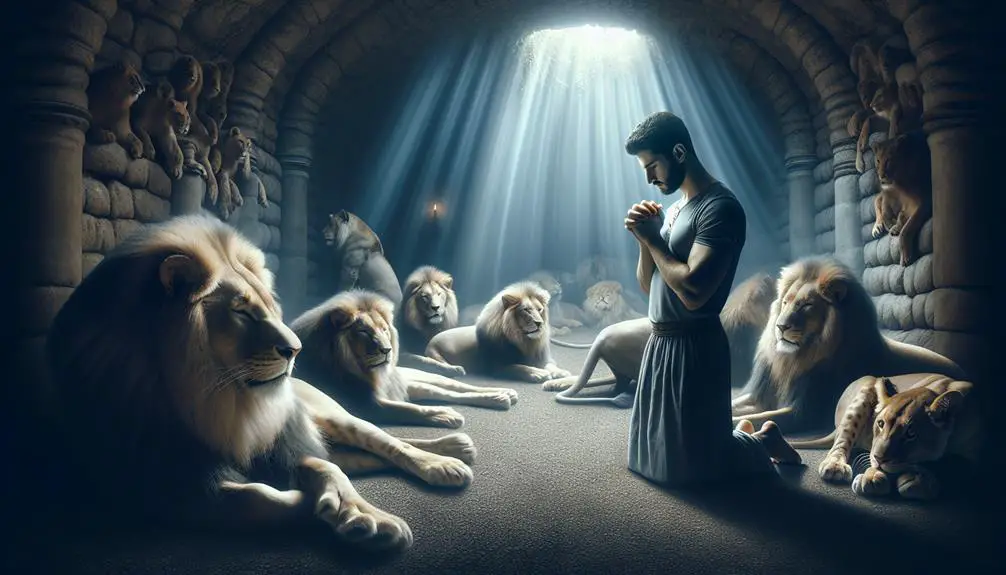
Venturing further into the realm of biblical narratives that test faith, the story of Daniel in the Lion's Den exemplifies unwavering belief in the face of mortal peril. This account, found in the Book of Daniel, not only showcases Daniel's steadfast faith in God but also serves as a powerful illustration of lion's symbolism and the fulfillment of Daniel's prophecy.
Daniel's ordeal begins when his adherence to his faith, specifically his practice of praying three times a day, clashes with a decree that forbids prayer to anyone other than the king. Despite the decree, Daniel refuses to compromise his devotion, a decision that leads to his punishment: being thrown into a den of lions. Here, lion's symbolism is multifaceted. Traditionally, lions represent strength, power, and ferocity. However, in this context, they also symbolize the seemingly insurmountable challenges and threats to faith that believers may face.
Miraculously, Daniel survives the night unscathed, a testament to his unwavering faith and the divine protection afforded to him. This outcome not only vindicates Daniel but also fulfills his prophecy regarding God's deliverance and sovereignty. His faith, tested under extreme conditions, becomes a beacon of hope and a demonstration of divine fidelity.
Analyzing this narrative, you observe how it underscores the potency of faith in the face of adversity. Daniel's experience in the lion's den is emblematic of the trials that believers may encounter, yet it also affirms the triumph of faith and the protective power of divine providence.
Moses Parts the Red Sea
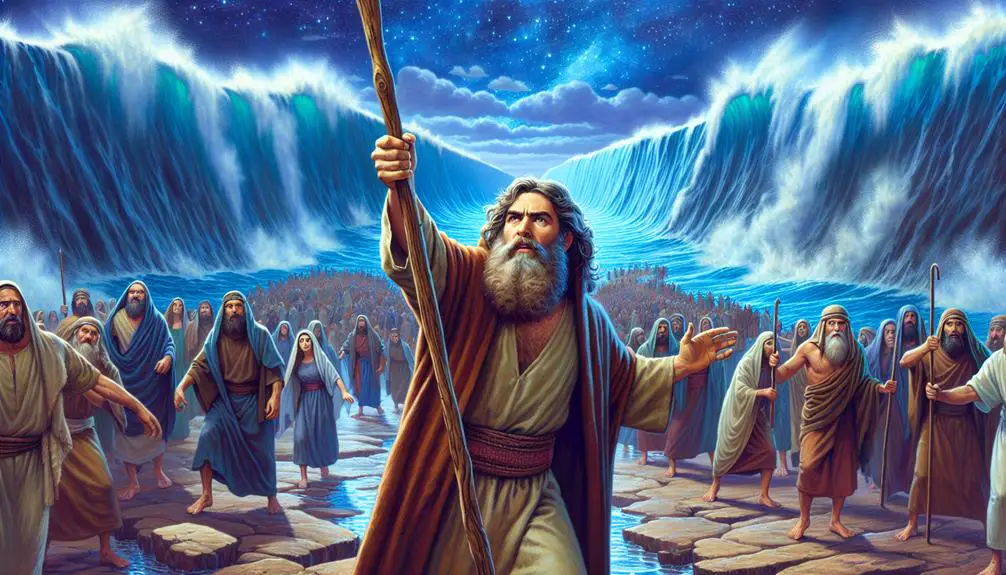
How does the miraculous event of Moses parting the Red Sea stand as a profound testament to faith's power in overcoming seemingly insurmountable obstacles? This narrative, deeply embedded within religious texts, offers a critical examination of the sea parting mechanics, underpinning the feat not as an act of magic, but as a divine intervention facilitated through unwavering faith and leadership under God.
Analyzing this event, you'll find that Moses, as a leader, is initially confronted with an impossible situation: the encroaching Egyptian army and a vast, impassable sea. Here, the mechanics of sea parting become less about the physical act and more about the faith required to invoke such a miracle. It's Moses' steadfast belief in God's power that initiates the event, serving as a conduit for divine intervention. This act of faith doesn't just physically alter the landscape; it transforms the psyche of the Israelites, fostering a collective belief in their deliverance and future.
Leadership under God is another critical aspect illuminated by this event. Moses' role isn't simply that of a leader; he's a vessel through which God's will is manifested. This narrative underscores the importance of divine guidance in leadership, suggesting that true leadership is about faith in a higher power's plan, rather than in one's own abilities.
In essence, Moses parting the Red Sea is emblematic of faith's dual role in overcoming obstacles and in guiding leadership. It teaches that at the heart of every seemingly insurmountable challenge lies the potential for divine transformation, provided there's unwavering faith in God's omnipotence.
Joshua and Jericho's Walls
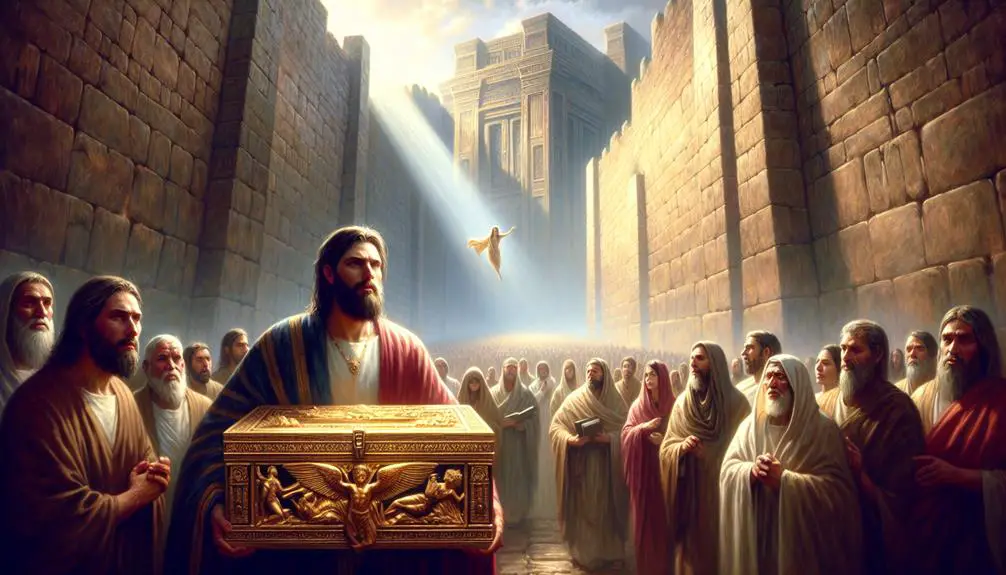
As you examine the narrative of Joshua and the fall of Jericho's walls, you encounter a profound display of faith and obedience.
Joshua's obedient march around the city, culminating in the miraculous collapse of its walls, underscores the tangible outcomes of unwavering faith.
This episode vividly illustrates how faith, when paired with action, can lead to extraordinary results, revealing the depth and power of belief in the divine.
Joshua's Obedient March
In the biblical narrative, Joshua's obedience to God's command catalyzed the miraculous fall of Jericho's walls, showcasing a pivotal moment of faith in action. This period of Israelite history, marked by their entrance into the Promised Land, demonstrates Joshua's unwavering faith amidst daunting challenges.
Prior to the march, Joshua's encounter with Canaanite spies and the subsequent river crossing underscored his strategic acumen and deep trust in God's guidance. These preparatory actions, crucial to the Israelites' success, highlight the intricate relationship between divine command and human agency.
Joshua's adherence to God's instructions without hesitation exemplifies a profound gift of faith, setting the stage for the miraculous events that would follow, firmly anchoring this narrative as a testament to the power of obedience and belief.
Miraculous Wall Collapse
The collapse of Jericho's walls, following Joshua's faithful adherence to divine instruction, represents a quintessential moment of biblical miracle, blending faith with tangible outcomes. This event not only showcases a profound act of divine intervention but also raises intriguing questions about the factors at play, including the architectural integrity of ancient fortifications and the potential role of seismic phenomena in such miraculous occurrences.
- Seismic phenomena may offer a naturalistic explanation, yet can't fully account for the timing and specificity of the collapse.
- The walls' architectural integrity, typically designed to withstand assaults, suggests an extraordinary cause.
- This event underscores the intersection of faith, divine will, and physical reality.
- It challenges readers to consider the limits of human understanding in the face of divine action.
- The narrative invites scholarly and theological exploration into the mechanisms of miracles.
Faith's Role Revealed
Exploring the biblical narrative of Joshua and the fall of Jericho's walls reveals how faith played a pivotal role in this miraculous event. This story is a profound example of faith healing and spiritual warfare in action.
Joshua's unwavering belief in God's promise exemplifies the power of faith to overcome seemingly insurmountable obstacles. The act of marching around the city, following God's specific instructions, without resorting to conventional warfare tactics, underscores a reliance not on human strength but on divine intervention.
This episode highlights the essence of spiritual warfare, where victory is achieved through faith and obedience to God's commands rather than through physical might or strategy. It's a testament to the belief that faith, when genuinely embraced, can bring about extraordinary outcomes against overwhelming odds.
Peter Walks on Water

You'll find that the account of Peter walking on water embodies a profound demonstration of miraculous faith, yet it also encapsulates a pivotal moment of overcoming doubt.
This narrative offers a rich analysis of how faith can momentarily elevate one above natural laws, only to be challenged by human skepticism.
Understanding this duality provides key insights into the dynamic nature of faith in the Bible.
Miraculous Faith Display
Occasionally, biblical narratives vividly illustrate the extraordinary potential of human faith, as exemplified when Peter walks on water towards Jesus. This moment isn't just a testament to Peter's courage; it symbolizes the broader implications of unwavering belief and its capacity to manifest the seemingly impossible.
- *Peter's action underscores the link between trusting prayer and extraordinary outcomes.*
- *It exemplifies the direct correlation between faith's intensity and its miraculous manifestations, such as healing miracles.*
- *The narrative invites believers to contemplate the depth of their faith.*
- *It challenges readers to embrace faith actively, not passively.*
- *This event demonstrates faith's power to transcend natural laws, encouraging believers to trust in divine possibilities.*
Analyzing Peter's walk on water reveals profound insights into the dynamics of faith and its potential to alter reality.
Overcoming Doubt Moment
In the narrative where Peter walks on water, his initial step represents a pivotal moment of overcoming doubt through an act of profound faith. This episode serves as a powerful testament to the dynamics of faith and doubt in the human experience.
Aspect |
Peter's Experience |
Application |
|---|---|---|
Doubt's Origin |
Fear of the storm |
External challenges |
Faith's Initiation |
Jesus' invitation |
Divine call |
Faith's Restoration |
Jesus' support |
Divine intervention |
Outcome |
Brief success, then falter |
Learning curve |
Peter's venture onto the water illustrates that faith can momentarily elevate one above the natural laws, yet doubt, often stirred by external circumstances, can quickly diminish that elevation. Nonetheless, the narrative underscores that faith's restoration comes through acknowledging one's vulnerability and trusting in divine support.
The Faith of the Centurion
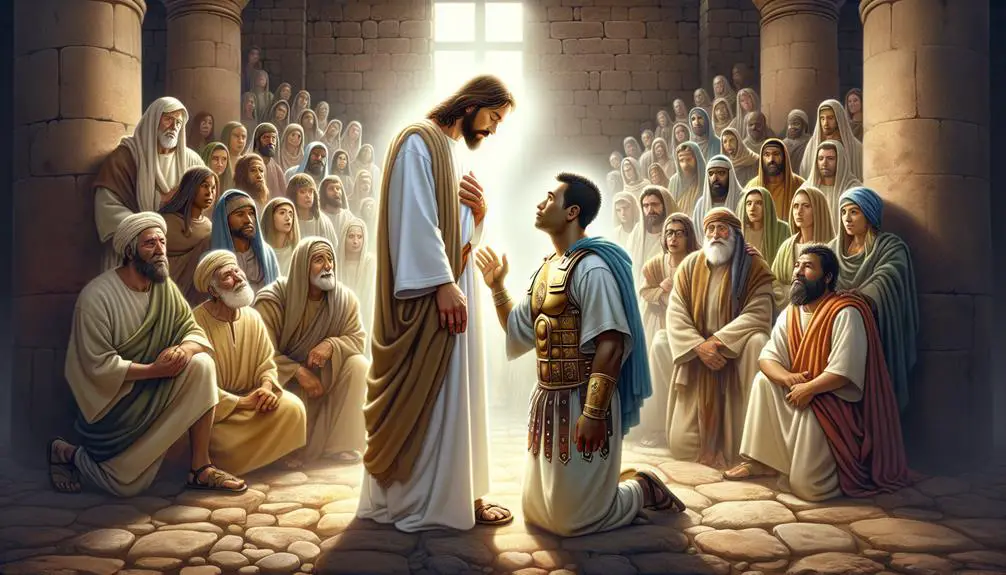
Exploring the faith of the Centurion, we encounter a profound example of unwavering belief and trust in Jesus' authority within the New Testament narrative. This passage vividly illustrates the intersection of Roman authority and the miraculous servant healing, offering a unique perspective on faith that transcends societal and cultural barriers.
- Recognition of Authority: The Centurion, despite his high rank within the Roman military hierarchy, recognizes Jesus' supreme authority. This acknowledgment is pivotal, underscoring a faith that sees beyond the physical and temporal into the spiritual realm.
- Expression of Humility: Demonstrating humility, the Centurion believes unworthy to have Jesus enter his home, an act that reflects a deep respect for Jesus' holiness and an understanding of his own place before God.
- Demonstration of Faith: The Centurion's request for Jesus to merely say the word for his servant's healing exemplifies a faith that doesn't require physical presence or signs to believe.
- Jesus' Commendation: Jesus commends the Centurion's faith as unparalleled in Israel, highlighting the significance of faith that doesn't rely on sight or physical evidence.
- Implications for Believers: This narrative encourages believers to possess faith that recognizes Jesus' authority, practices humility, and trusts in His word for our needs, without needing physical manifestations of His power.
The Centurion's faith, deeply rooted in an understanding of authority and trust, offers a compelling model for contemporary believers. It invites reflection on the nature of faith that pleases God, emphasizing trust in divine authority over physical proof or proximity.
Elijah's Challenge on Mount Carmel
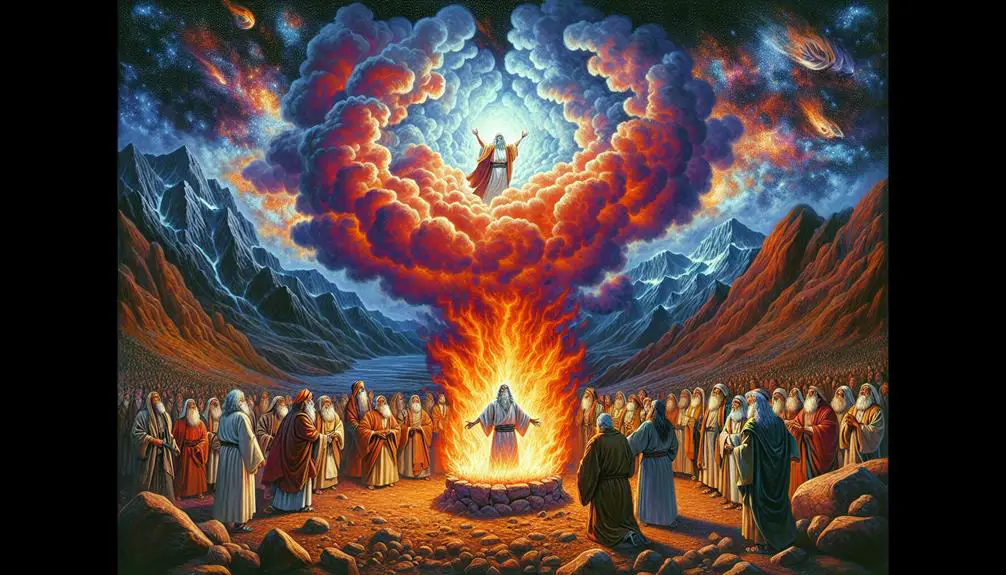
Shifting focus from the New Testament to the Old, we encounter Elijah's Challenge on Mount Carmel, a pivotal moment that starkly showcases the power of faith in confronting idolatry. Elijah, a prophet of the God of Israel, faces off against 450 prophets of Baal in a dramatic rain confrontation. This event not only tests the prophets' powers but also the faith of the Israelites and the authenticity of the deity they choose to worship.
Elijah proposes a test to determine the true God: both he and the Baal prophets would prepare a bull for sacrifice, but neither would set fire to it. Instead, they would call upon their respective deities to send fire from heaven. The Baal prophets fervently pray all day, to no avail. In contrast, Elijah's simple prayer is immediately answered with fire from heaven, consuming his sacrifice.
Aspect |
Elijah's Faith |
Baal Prophets' Efforts |
|---|---|---|
Preparation |
Single, calm prayer |
Frantic, day-long rituals |
Response |
Immediate fire from heaven |
No response |
Outcome |
God's power unequivocally demonstrated |
Baal's impotence exposed |
Impact on Israel |
Renewed faith in God |
Rejection of Baal |
Symbolism |
God's supremacy and faithfulness |
Idolatry's futility |
This narrative underscores the efficacy of faith over idolatry. The rain confrontation is not merely a test of divine power but a profound lesson on the supremacy of faith in God over any form of idol worship. Elijah's unwavering belief and the subsequent divine intervention serve as a potent reminder of the might of true faith, contrasting sharply with the futile efforts of the Baal prophets.
Shadrach, Meshach, and Abednego's Fiery Trial
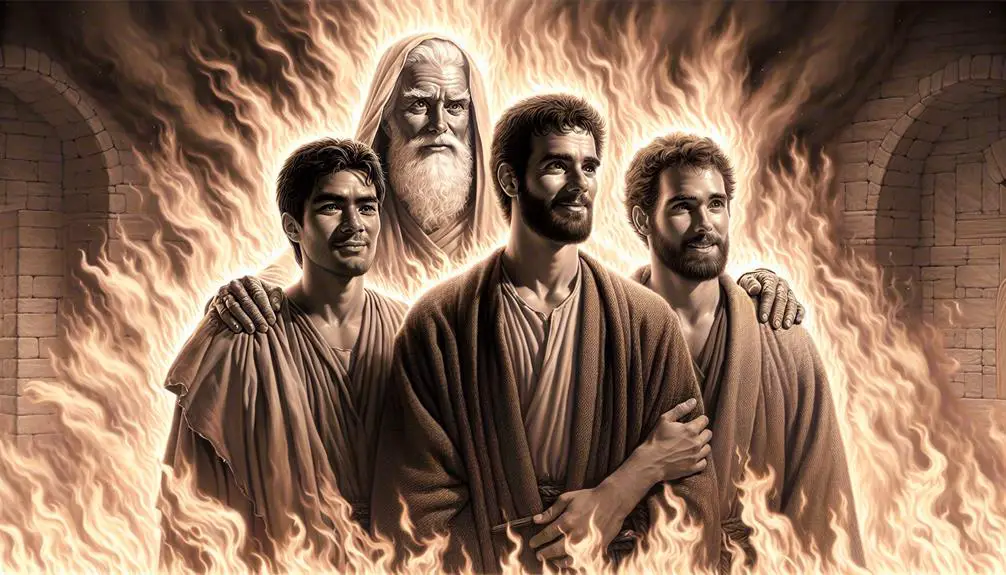
Transitioning from the demonstration of divine power on Mount Carmel, we now examine the unwavering faith of Shadrach, Meshach, and Abednego, who faced a fiery furnace for defying King Nebuchadnezzar's decree to worship an idol. This narrative, deeply embedded in the Book of Daniel, isn't merely a tale of survival but a profound testament to the gift of faith in the face of utmost adversity.
The account of these three young men, who were captives in Babylon, unfolds against the backdrop of Nebuchadnezzar's dream, which Daniel interprets, gaining favor for them. However, their faith is tested when they refuse to bow to a golden image erected by Nebuchadnezzar, leading to their sentencing to a fiery furnace—a punishment meant to be certain death.
Here are five key points to understand their trial:
- Faith Over Fear: They chose faith in God over fear of earthly power, demonstrating unwavering trust.
- Divine Deliverance: Their miraculous survival, unharmed, in the fiery furnace signifies divine intervention.
- Witness to Power: Nebuchadnezzar witnesses this divine protection, leading to a declaration of respect for their God.
- Test of Loyalty: Their trial tests not just their faith but their loyalty to God above any earthly ruler.
- Symbol of Resilience: Their story is a timeless symbol of resilience in faith amidst persecution.
Analyzing this episode reveals the depth of their conviction and the power of faith to deliver and protect. Shadrach, Meshach, and Abednego's experience in the fiery furnace remains a compelling illustration of faith's capability to transcend even the most dire circumstances.
Frequently Asked Questions
How Does the Concept of the Gift of Faith Differ Between Various Christian Denominations, and How Is It Interpreted Outside of These Specific Biblical Stories?
You'll find denominational differences shape how the gift of faith is viewed, with some emphasizing miraculous faith and others a more personal, enduring belief.
Outside Christianity, interfaith interpretations might see it as akin to deep spiritual conviction, not tied to miracles but to a profound sense of trust and hope in one's beliefs.
This nuanced perspective highlights how faith's role varies widely, reflecting a rich tapestry of religious thought and experience.
Are There Any Modern-Day Examples or Testimonies That Mirror the Magnitude of Faith Demonstrated by These Biblical Figures, and How Are They Recognized Within the Church Community?
You might wonder if modern-day examples of faith match those from ancient texts. Indeed, faith documentaries and community testimonies offer insight. They showcase individuals whose conviction mirrors biblical figures, demonstrating profound faith in challenging circumstances.
These stories are celebrated within church communities, serving as inspiration and evidence of faith's enduring power. Analyzing them, you'll find a rich tapestry of belief that resonates across time, continually recognized and revered.
How Do Theologians Reconcile Instances Where Individuals Exhibit Strong Faith yet Do Not Experience Miraculous Outcomes as Seen in These Biblical Narratives?
Navigating through a sea of miraculous expectations, theologians approach the Faith vs. Outcome dichotomy with a scholarly lens. They argue that faith isn't a transactional ticket to miraculous outcomes.
Instead, they dissect the essence of faith, emphasizing its intrinsic value over external rewards. This analytical perspective reconciles the apparent disparity, highlighting that faith's true measure isn't in the outcomes but in the steadfastness and depth of belief itself.
In What Ways Can the Gift of Faith Be Cultivated or Strengthened in Individuals Who Struggle With Doubt or Lack of Belief, According to Contemporary Christian Thought?
To cultivate or strengthen your faith, especially if you're battling doubt, engaging in faith exercises and seeking community support are key strategies.
Faith exercises, like prayer, meditation, and studying scripture, can deepen your understanding and connection to your beliefs.
Meanwhile, leaning on a supportive faith community provides encouragement and insight, helping you navigate through periods of uncertainty.
These practices, grounded in contemporary Christian thought, can significantly bolster your faith journey.
How Do Non-Christian Religions or Belief Systems View the Concept of the Gift of Faith, and Do They Have Comparable Stories of Extraordinary Faith in Their Religious Texts or Traditions?
Diving into the vast sea of belief, you'll find that non-Christian religions and belief systems also cherish the concept of faith, albeit through different lenses.
Interfaith dialogues reveal that spiritual practices across these traditions often embody stories of extraordinary faith, mirroring the profound experiences found in Christian texts.
Through meditation, prayer, or ritual, followers cultivate a deep, resonant faith, showcasing that the gift of faith transcends cultural and religious boundaries.
Conclusion
In analyzing these biblical narratives, it's evident that the gift of faith serves as a beacon, guiding individuals through their darkest trials. Abraham's sacrifice, Daniel's courage, and Moses's leadership symbolize the transformative power of unwavering belief.
Like a lighthouse enduring the storm, faith steers believers towards divine promises, illuminating paths shrouded in uncertainty. These stories not only depict faith's capability to conquer fear but also its role in shaping destinies, reflecting an eternal truth across ages.

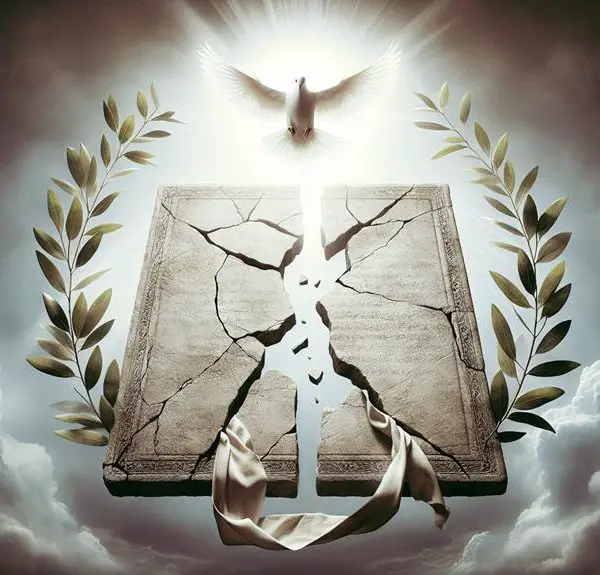
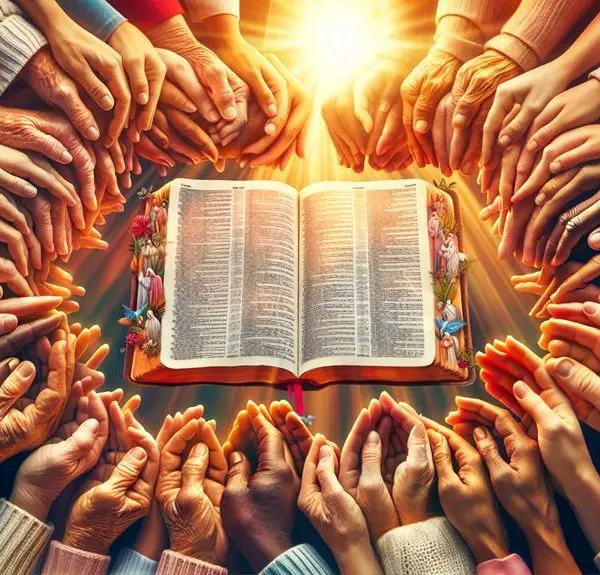
Sign up